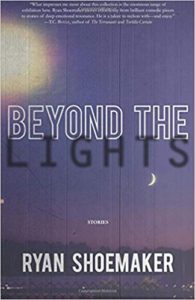 Author: Ryan Shoemaker
Author: Ryan Shoemaker
Title: Beyond the Lights: Stories
No Record, 2018. 192 pages. Reviewed by David Harris, Nov. 22, 2018. 5 stars.
This short story collection reminds me a bit of Steven Peck’s Wandering Realities: Mormonish Short Fiction. Not because of any particular similarities in plots or themes but rather due to the sheer variety of settings and characters in both collections.
I’ve always enjoyed travel writing, and these stories have an element of that in them. In one, an ordinarily overly cautious and thrifty young man splurges on an expensive wedding ring and sets out across I-80 from Salt Lake City toward California, where he intends to propose to the woman who has just broken up with him and returned to her hometown. Along the way, he gets stranded in remote Wells, Nevada. Shoemaker deftly captures the character of rural Nevada towns in his depictions of a mechanic’s shop in a dumpy cinderblock building, a brothel peopled with worldly wise and sarcastic young women and eager yet forlorn Johns, and the hot desert wind blowing through the streets at twilight.
In another, suburban high school kids skip school to sneak into Seattle to attend pro-environment demonstrations and plot to run away and join the crew of an anti-whaling ship when they turn 18.
Then there’s the succinct account of Elder Brigham Kimball’s two-year mission to Nicaragua, condensed down to five pages.
Phoenix is the setting of yet other stories in this collection, and the sterile, Disneyland-like setting of so much of the suburban sprawl which defines the Arizona capital and adjoining cities comes through in Shoemaker’s tale of of a policeman who makes it his personal mission to shut down a low-priced cleaning service manned by illegals which is putting his sister’s own operation out of business.
In yet another story, the bright lights of a generic big-box store take on nightmarish qualities as a young man seeks to wend his way through a proliferation of sprawling aisles to the exit yet cannot seem to ever find his way there.
I like literature which causes me to question my assumptions about morality. Shoemaker’s stories are inhabited by characters who make us do that. Norman is a faithful Mormon and a good steward of his finances, but he comes to understand that his friends view him as a cheapskate who takes advantage of their good will. Reed outwardly mocks the angels and golden plates which define the Mormon worldview his parents have taught him to venerate, yet he devotes years of his life to fighting for the rights of underprivileged people and protecting the environment. And the Phoenix policeman mentioned above uses his position to pursue a personal agenda yet breaks no laws in doing so. Which of these men is justified in his actions? Shoemaker leaves it up to us to make that judgment.
In another story, high school friends out on a lark spray water from a fire extinguisher at strangers from their car. They do this night after night, and they consider it good clean fun which doesn’t hurt anyone. The victims, however, feel differently, which these kids learn when they are caught unawares one night by two rough-looking toughs they have soaked down a short time before. The ensuing punishment is significantly out of scale for their crime, yet it’s difficult to sympathize with the boys because they have taken their fun a bit far tonight, humiliating a woman who is down on her luck and just trying to get to a safe place.
By the way, while these stories are, for the most part, about Mormons, Mormonism comes up in them only tangentially here and there. They feel like stories about the western United States where, inevitably, Mormons crop up from time to time. This is a departure from earlier generations of Mormon literature, where religion was almost always at the center of the plot in some shape or form. I wonder if this might reflect a more general trend in younger generations of the Church, where religious devotion has either taken a backseat to other pressing concerns or is seen as a more private matter not appropriate for discussion in a public setting such as literature. In any case, it opens up these stories to a wider market potentially, i.e. to those who may not have any particular interest in the LDS church or the culture it has spawned.
